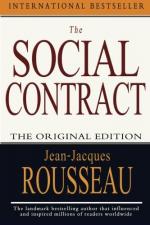
|
| Name: _________________________ | Period: ___________________ |
This test consists of 15 multiple choice questions and 5 short answer questions.
Multiple Choice Questions
1. Which of the following does the author use when he seeks to show how the Sovereign Will can be transformed into a democracy?
(a) British House of Commons.
(b) French House of Commons.
(c) Italian House of Commons.
(d) German House of Commons.
2. The author states that warm countries are more often the scene of revolution because it is easy for the people to do which of the following?
(a) Revolt.
(b) Communicate.
(c) Arm themselves.
(d) Hide themselves.
3. Which of the following is needed when it becomes difficult to have a just, effective balance between the various levels of government?
(a) Counts.
(b) Committees.
(c) New government.
(d) Tribunes.
4. The author thinks that, as an expression of the Sovereign Will, the purer the expression means the greater of which of the following?
(a) Minority votes.
(b) Number of votes.
(c) Majority votes.
(d) Number of voters.
5. The censor monitors and enforces which of the following?
(a) Religion.
(b) Legalities.
(c) Laws.
(d) Morality.
6. Which of the following does the Sovereign Will become when private interests dominate government?
(a) A fake.
(b) An illusion.
(c) Corrupt.
(d) Imaginary.
7. Which of the following terms is used to refer to anything that takes the citizen away from that which he perceives as his life of relative ease?
(a) Inconveniency.
(b) Duty.
(c) Obligations.
(d) Responsibilities.
8. Which of the following terms best describes all assemblies by the people that fall outside the two types of assemblies that the author describes?
(a) Individual.
(b) Unauthorized.
(c) Illegal.
(d) Immoral.
9. The author believes that a good government must be which of the following?
(a) Based on society.
(b) Adaptable.
(c) Legal.
(d) Justice-based.
10. The author believes that warm countries need which of the following in fewer numbers?
(a) Laws.
(b) Fields.
(c) People.
(d) Rules.
11. How long did the "one citizen one vote" system last in Ancient Rome?
(a) 20 years.
(b) 15 years.
(c) 5 years.
(d) 10 years.
12. In order to keep all the cities equal within the state, what does the author suggest be moved from city to city?
(a) The armies.
(b) The residence of the Prince.
(c) The assemblies.
(d) The capital.
13. Which ancient civilization's voting practices does the author examine in Chapter 3, Book 4?
(a) Greek.
(b) Roman.
(c) Egyptian.
(d) Mayan.
14. The author maintains that any manifestation of the will of a minority is which of the following?
(a) Subversive.
(b) Dangerous.
(c) Exemplified.
(d) Tolerated.
15. Which municipal government does the author use as an example of an effective balance between election by lot and election by vote?
(a) London.
(b) Munich.
(c) Venice.
(d) Paris.
Short Answer Questions
1. How many votes does the author state need to be taken at each regular meeting of assemblies?
2. The views presented by the author on Christianity, would be considered which of the following by the Christian church?
3. The author believes that regular assemblies will prevent the rise of which of the following?
4. The author believes that if there were a state populated by which of the following, a democracy might be able to govern.
5. Why does the author suggest that, every few years, the tribunes be removed from the system of government?
|
This section contains 499 words (approx. 2 pages at 300 words per page) |

|




